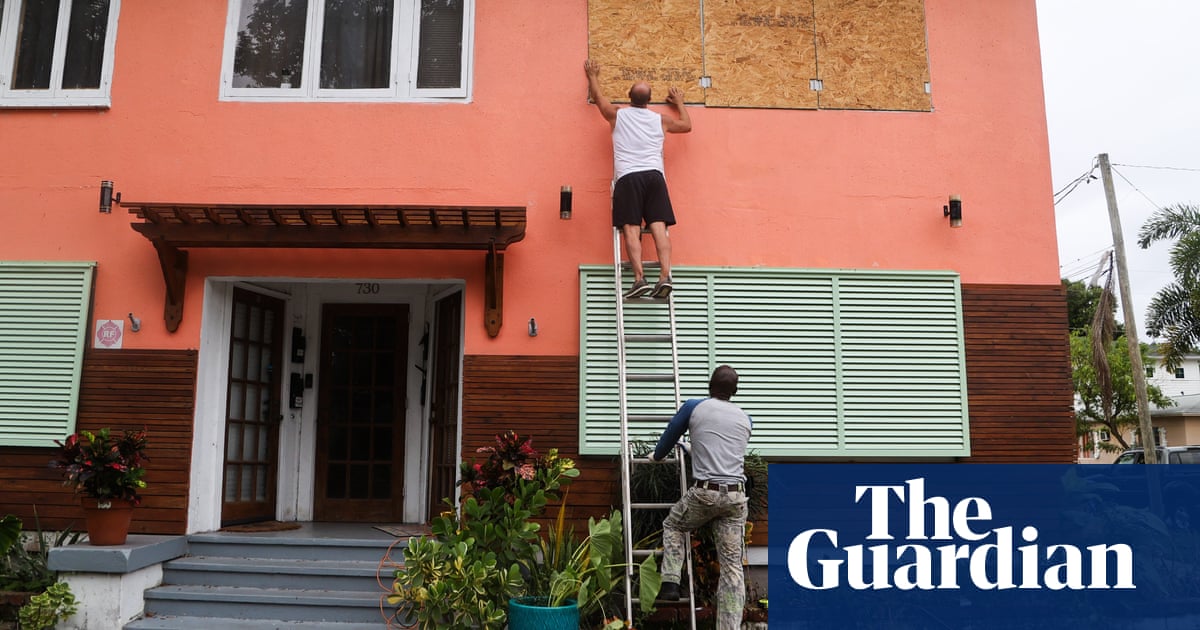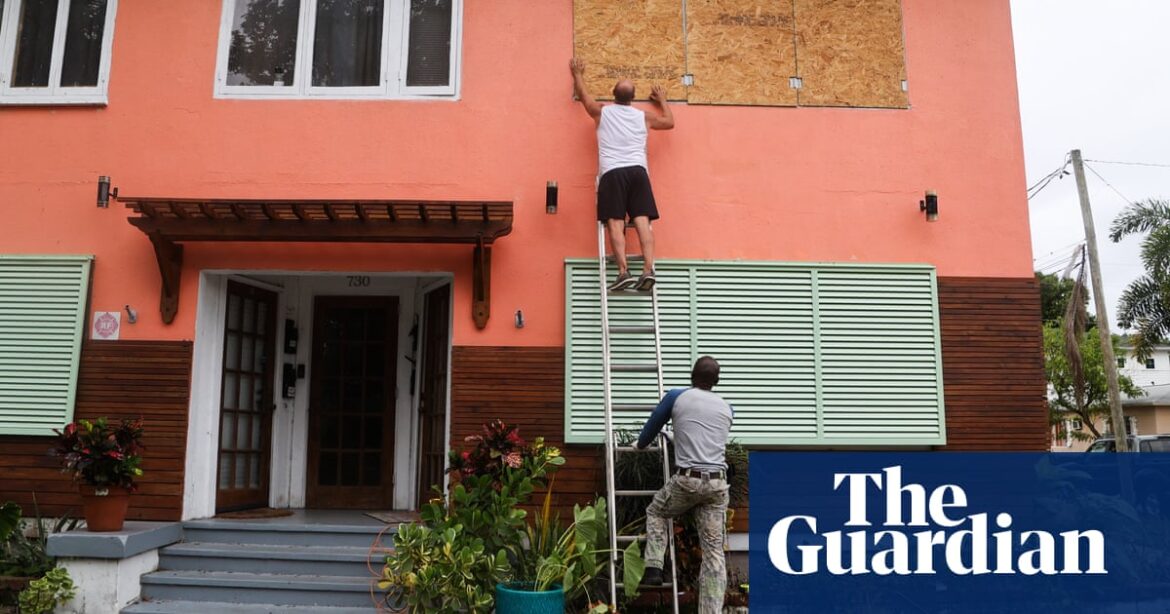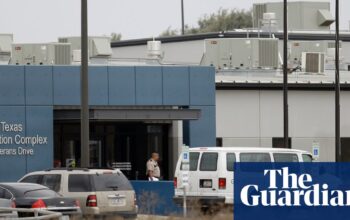
Florida’s western coast was making emergency preparations on Tuesday for the impact of Hurricane Milton, with thousands of evacuees clogging highways, contending with fuel shortages, and the mayor of Tampa warning residents bluntly “you are going to die” if they stayed behind.
The US National Hurricane Center (NHC) said Milton would retain major hurricane status and “expand in size” as it approached Florida after passing the Mexican city of Mérida before swerving north towards the US.
The eye of the storm closed overnight on Monday, and winds slowed slightly, before reorganizing as an “extremely dangerous” 155mph (250km/h) category 4 hurricane. As of Tuesday afternoon, the storm had restrengthened to a category 5 in the Gulf of Mexico.
With up to 15ft (4.5 metres) of life-threatening storm surge, Milton has the potential to be “one of the most destructive hurricanes on record for west-central Florida”, the NHC said.
“This is a very serious threat and residents in Florida are urged to listen to local officials,” the center said. Residents should get “their families and homes ready” – and evacuate if told to do so.
Joe Biden said that Hurricane Milton could be one of the worst storms in the US for 100 years and advised residents to leave immediately as “a matter of life and death”.
Milton is projected to hit the south-west coast of Florida by Wednesday evening local time, the US National Weather Service said in its latest update, and could cause destruction in areas already reeling from Hurricane Helene’s devastation nearly two weeks ago.
Almost all of Florida’s west coast was under a hurricane warning, with more than a million people told to evacuate, fleeing potentially catastrophic damage and power outages that could last days.
Ron DeSantis, the Florida governor, warned residents intending to leave that they were almost out of time. “If you’re gonna get out, get out now,” he told a Tuesday afternoon press conference.
At a briefing earlier in the day, he said: “Let’s prepare for the worst and let’s pray that we get a weakening and hope for the least amount of damage as possible, but we must be prepared for a major, major impact to the west coast of Florida.”
The US president cancelled a trip to Angola and Germany less than a day after it was announced during a briefing that abruptly ended when the press secretary, Karine Jean-Pierre, stormed out, accusing journalists of spreading misinformation in response to questions about emergency disaster funding.
The president also approved DeSantis’s request for a federal emergency declaration and said disinformation in the wake of Hurricane Helene was “unAmerican”.
That came after a DeSantis aide said the governor was not taking Vice-President Kamala Harris’s calls, pointing to the intense politicization around the response to Helene and Milton.
Harris later said that moments of crisis “should really be the moment that anyone who calls themselves a leader says they’re gonna put politics aside and put the people first”.
DeSantis responded that for Harris to “say that my sole focus on the people of Florida is somehow selfish, is delusional”.
“She has no role in this. In fact, she’s been vice-president for three and a half years. I’ve dealt with a number of storms under this administration. She has never contributed anything to any of these efforts, and so what I think is selfish is her trying to blunder into this,” he continued.
With one day left for people to leave, local officials raised concerns about traffic jams and long queues at fuel stations as well as discarded household debris piled up on sidewalks after last week’s Hurricane Helene that could become projectiles when Milton’s winds hit.
DeSantis told reporters crews had made “a huge dent” in debris removal, carting away 1,300 truckloads in little more than 48 hours.
Almost one-fifth of Florida’s gas stations were out of fuel by Tuesday afternoon, however, according to the tracking website GasBuddy. It said 17.4% of stations were dry by 2pm, up from 14.5% earlier in the day.
US forecasters and officials fear Milton could make landfall in the Tampa Bay region, home to more than 3 million people. Tampa has not had a direct hit by a major hurricane since 1921.
Hurricane damage modellers have for years warned that the Tampa Bay area is particularly vulnerable to rising seas caused by storm surges, due to its wide and shallow seabed, which can push water upwards.
The mayor of Tampa, which is low-lying, issued a stark warning to residents as Hurricane Milton dashed across the Gulf of Mexico.
“If you choose to stay … you are going to die,” said the mayor, Jane Castor.
Castor delivered the blunt assessment to CNN on Monday while also describing Milton as a “literally catastrophic” hurricane projected to push up to 15ft of Gulf water inland – an amount that officials say is deadly.
Hurricane Helene, which made landfall in late September, caused more than 200 deaths and catastrophic damage stretching from Florida to the Appalachian mountains. There are fears that mounds of building rubble left in Helene’s wake could turn into dangerous debris if caught up in Milton’s floods and winds.
The National Weather Service downgraded Milton early on Tuesday to a category 4 hurricane but forecasters said it still posed an extremely serious threat. Around 5pm EST on Tuesday, the National Hurricane Center announced that Milton had re-energized to “category 5 strength”.
“While fluctuations in intensity are expected, Milton is forecast to remain an extremely dangerous hurricane through landfall in Florida,” the agency said.
The slight weakening from category 5 status occurred after Milton’s barometric pressure rose slightly to 924mbar from 879mbar. That happened as Milton appeared to be undergoing an eye wall replacement, which can briefly raise barometric pressure and reduce its intensity.
However, the phenomenon tends to make a hurricane wider, increasing its windfield. Projections expect the hurricane to restrengthen to a category 5 then weaken as it approaches Florida, though the storm’s effects are still going to be potent.
Milton is due to become the 10th major hurricane – category 3 or higher – to make landfall along the US’s Gulf coast since 2017, gaining power from the warm seas in the Gulf. Milton was the third fastest-intensifying storm on record in the Atlantic Ocean, the agency said.
Weather and climate experts attribute such a high rate of powerful, destructive storms to the climate crisis, spurred by the burning of fossil fuels.
Before Milton’s arrival, DeSantis, declared a state of emergency for 51 of its 67 counties. “What you don’t want to do is stay in an area where you have 10, 15ft of storm surge,” he told Fox News on Monday.
DeSantis also told Floridians to make sure they had a week’s food and water and were braced for more evacuation orders.
The governor is pro-fossil fuels and has criticised climate action as being led by “radical green zealots”.
-
Reuters and the Associated Press contributed to reporting
Source: theguardian.com



